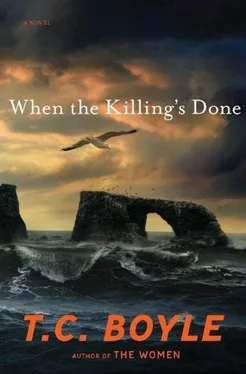She smells the gun, the rain, the blood, and here come the dogs — a pair of Frazier’s prize Australian Bull Arabs, with their straining shoulders and their great wide heads and snouts and the light of the kill shining in their eyes. They break from the bushes in a rush and fall on the hog — a boar, a big boar with meshed white tusks — till Frazier calls them off and strides up to deliver the coup de grâce with the pistol he wears in a holster at his side. One more snap and the dogs sit back on their haunches. There are voices now, Kiwi voices, riding up from somewhere below. “You get him, Fraze?”
“Never miss,” he shouts back. “But you lads’re getting sloppy. If he gets away, he’s going to be one tough hog to hunt down next time.”
The rebuke hangs there in the air a moment, and then one of the voices below — she recognizes it as belonging to Clive Hyndman, a blond twenty-six-year-old with a perpetually peeling nose and legs so good he could have been modeling his khaki shorts for money — comes back at them. “We got the sow and three piglets. Didn’t even know the old man was there till he started running up the hill.”
And Frazier, cupping his hands to his mouth: “No worries, mate. Just so long as he didn’t get away. Now, are you coming up here or am I going down there?”
She can hear them working their way up from below, a scratching and rustling accompanied by the clatter of shingle scattering underfoot. The dogs, slick with wet, settle on their haunches, the pig of no interest to them now — it’s the living pig that pushes their buttons, the fleeing pig, the mysterious thing that bolts at the sound of their conjoined voices and never stops till they’ve got it cornered and the man with the gun is wading in for the finale. She wants to sit down on the nearest rock — her legs are lifeless, numb, too weak to support her — but instead she finds herself standing over the carcass as if she’s willed it into existence. It’s bigger than she thought it would be, huge really, three or four hundred pounds, its fur brindled and shaggy, more like a sheepdog’s than the smooth brushed coat of the domestic hogs she’d seen rooting around the villages in Guam. Frazier’s first shot, the one from the rifle, severed the carotid artery and a loop of bright oxygen-rich blood arced away from the wound till the heart stopped pumping and the flow faltered like the choked-off stream of a garden hose. The blood shadows the carcass now, so dark it could be oil, as if the animal had stumbled and fallen in a seep.
Rain stirs the dense tangle of fur, drops silently into the fixed and unseeing eyes, the delicacy of the lashes there, the canthic folds, the deep rich chocolate brown of the irises. She bends from the waist to see more clearly, ignoring the riveting of the rain. The hooves fascinate her. She’s never seen a hoof up close before — it’s so neatly adapted to its task, a built-in shoe shining and dark with the wet, as impervious as if it were molded of plastic. And the ears, the way the ears stand straight up, like a German shepherd’s, to collect and concentrate the sounds that only come to us peripherally. The heavy shoulders, the neat arc of the haunches, the switch of the tail. This wild thing, this perfect creature. She feels the sorrow in the back of her throat, the sorrow of existence, and if she could have brought the animal back to life, restored it to some other ecosystem where it could belong and thrive and live out its time under the sun, she would have done it.
Frazier comes up behind her. “Five down,” he says, “and bloody hundreds to go.”
She just nods. “It’s kind of”—and she feels like an idiot even before the words are out of her mouth—“neat, though. Healthy, I mean. A good specimen.”
“Oh, yeah,” Frazier says, stepping forward to tap the carcass with the toe of his boot. “He’s in his prime, no doubt about it. Probably been out there making all the little piggies he can. But see this?” His boot poking at the jaws now. “These tushes? He could rip the guts out of a dog in a heartbeat with these things and no mistaking it. This is one mean animal. And you can tell by the way he was coming at us he didn’t really have any charitable notions in his head.”
He’s right. Of course he’s right. These animals have to be eliminated and if you stop to see them as individuals you’re done. How many acorns will have the chance to germinate and grow into trees to shade the terrain and capture mist in their spreading branches because this pig at their feet won’t be there to glut himself on them? Five down. Hundreds to go.
At that moment Clive emerges from the chaparral downslope, his shorter but just as sturdy and just as sunburned companion following close behind pulled by two more dogs on leashes. The men are dressed identically: gaiters, shorts, ponchos, wide-brimmed hats. Both carry rifles of the same make and caliber as Frazier’s. “Jesus, what a day,” Clive hollers in his high husky voice that always seems to be going hoarse on him. “I say we’re lucky to get what we got because the critters aren’t stupid — they’ll all be hunkered in cover while it’s coming down like this.” And then, as if just noticing her, he touches the dripping brim of his hat and says, “Hi, Alma. Nice day, huh?”
The other hunter — he won’t look directly at her, not yet — lets go of the leashed dogs so they can rejoin their compatriots in a brief exposition of shoulder bumping and tail wagging. “That’s a trophy animal there, Fraze,” he says, nodding in the direction of the boar. “Wish you’d left him for me.”
“Maybe Alma wants the tusks for a souvenir?” Clive says, giving her a sidelong glance.
“Sure,” the second one says, and he looks up now and there’s no mistaking the intent of his gaze, a healthy young man out in the bush bereft of the company of women, and he’s dissolved her clothes, healed her abrasions and wiped her clean of mud all in an instant, “but as I’m sure she knows that’ll require hacking off the head and burying it for a couple weeks so the beetles and worms can get at it. Try to pull those things out otherwise and they’ll snap off every time.” He looks to the dead animal and then comes back to her. “I’m A.P., by the way, short for Arthur Peter — don’t think we’ve had the pleasure.”
She takes the hand he offers — as cold and wet as hers — and murmurs, “I’m Alma. Nice to meet you. But maybe, given all that effort, we ought to just leave this one for the ravens.” Turning to Frazier, not for protection, not because the moment is awkward and she can feel the lust radiating like an aura from A.P. and Clive, but because she’s feeling good again, or better, and wants desperately to keep from breaking down in front of them, keep from showing weakness in the face of the killing and dying and death they take so casually. The necessary death. The death she’s ordered. As boss and overseer. “Right, Frazier?” she says, letting her voice rise in an easy jocular way.
“Royt. But then, and this is always a worry once you start in on these things, you’re going to have an artificial blip in the raven population, you know that, don’t you? — and nobody can say what effect that’s going to have down the road on, say, the island scrub jay or the side-blotched lizard or any of the other species you’re trying to preserve.”
“Okay then,” A.P. chirps, going down on one knee before the carcass, “let me just do some mouth-to-mouth here on this one and see if we can’t revive him—”
They’re standing unprotected in the rain, deep in a wild canyon on an island off the Pacific Coast on which there can’t be more than twenty people total at the moment, discussing the cascading effects of the artificial removal of one species to favor another. In all her years in the library, the classroom, at her desk in her dorm writing papers and dreaming of the outdoors, she couldn’t have imagined this. It feels good, though. It feels right. Ignoring A.P., she says, “Of course I’m aware of that. Providing this resource for the ravens is going to increase their numbers exponentially and once the carcasses are gone they’re going to starve and die back, but not before robbing every nest they can and predating anything that moves. . but we’ve got to take that chance. I mean, that’s what this is all about, isn’t it?”
Читать дальше












